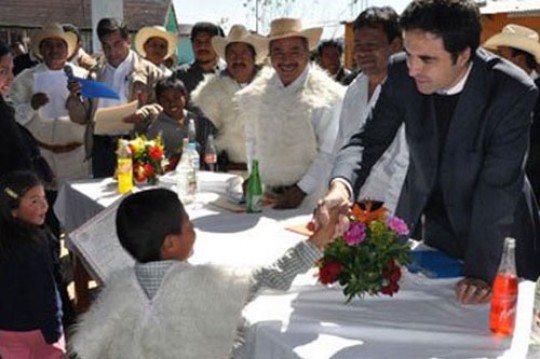Heeding UNICEF’s calls, Mexico makes progress towards free birth registration
Heeding UNICEF’s calls, Mexico makes progress towards free birth registration
UNICEF Deputy Representative in Mexico Javier Alvarez hands a birth certificate to Alberto, a boy from the Chamula indigenous community in Chiapas
2 December 2011 –
“Our role as UNICEF is to support society and governments uncover the predicament of children who are not registered, identify where they are, and ensure their registration through various strategies, guaranteeing their right to a name and a nationality, and subsequent access to health, social and education services,” said UNICEF Deputy Representative in Mexico Javier Alvarez.
UNICEF is currently working with the national statistical bureau to analyze the situation of birth registration in every municipality in the country. While 93.4 per cent of children are registered, certain states such as Chiapas, Guerrero, Oaxaca and Puebla – all places with indigenous and rural communities and a low level of human development – have a low registration rate. In Chiapas, for example, only 61.7 per cent of children were registered by their first birthday in 2009.
The agency has focused its work in the country on helping improve the legal framework, promoting birth registration in social policies such as health and education, and developing awareness initiatives, particularly through radio in indigenous languages, as well as improving access to registration in isolated areas.
###
About UNICEF
UNICEF works in 190 countries and territories to help children survive and thrive, from early childhood through adolescence. The world’s largest provider of vaccines for developing countries, UNICEF supports child health and nutrition, good water and sanitation, quality basic education for all boys and girls, and the protection of children from violence, exploitation, and AIDS. UNICEF is funded entirely by the voluntary contributions of individuals, businesses, foundations and governments. For more information about UNICEF and its work visit: www.unicef.org
###
> United Nations (UN).
 The United Nations was established on 24 October 1945 by 51 countries committed to preserving peace through international cooperation and collective security. Today, nearly every nation in the world belongs to the UN: membership totals 192 countries.
The United Nations was established on 24 October 1945 by 51 countries committed to preserving peace through international cooperation and collective security. Today, nearly every nation in the world belongs to the UN: membership totals 192 countries.
When States become Members of the United Nations, they agree to accept the obligations of the UN Charter, an international treaty that sets out basic principles of international relations. According to the Charter, the UN has four purposes:
- to maintain international peace and security;
- to develop friendly relations among nations;
- to cooperate in solving international problems and in promoting respect for human rights;
- and to be a centre for harmonizing the actions of nations.
###
* The above story is adapted from materials provided by United Nations (UN)
** More information at United Nations (UN)



















